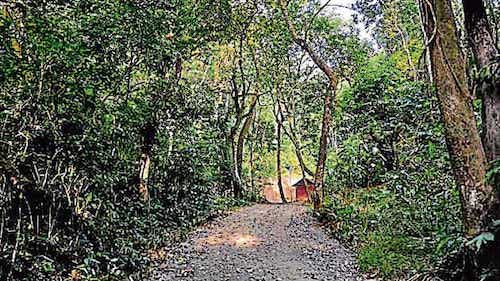Phayeng
This is a collection of articles archived for the excellence of their content. |
Carbon positive status
2019
Jayashree Nandi, Apr 01, 2019: Hindustan Times

From: Jayashree Nandi, Apr 01, 2019: Hindustan Times
Amid the ongoing debate over the role of forest dwellers in conservation, a village that is home to 660 households in Manipur is using its lush community-managed forest to develop itself as India’s first carbon-positive settlement.
A village is given the carbon-positive tag if it sequesters more carbon than it emits, slowing the accumulation of greenhouse gases and mitigating the effects of climate change. Phayeng, which is surrounded by three densely forested hillocks with fruit trees at centre and a stream flowing through it, has been resurrected from the dry and denuded village it was in the 1970s and 80s through the sheer determination of its residents and funding under National Adaptation Fund for Climate Change (NAFCC), a central scheme to support adaptation to climate change impact in various states.
“We had no tree on these hills earlier. Our fathers had deforested them because of timber-related disputes. But villagers started realising that the area had become extremely warm; there was no water and people were falling ill. So villagers decided that the forest should be rejuvenated at any cost. Our umang kanba (forest protection committee) came up with various rules and involved all 660 families in the village in recreating the forest,” said Angom Gajendra, former village chief and a forest committee member.
The cause of forest dwellers has been at the centre of a public debate following a central government petition last month to Supreme Court against its order for eviction of a million tribals and others who allegedly encroached on forest lands.
Phayeng is a scheduled caste village of the Chakpa community in Imphal West district and its conservation efforts are mainly linked to the belief that the forest is a sacred grove, but the idea has changed over the years.
“Locals have now realised the value of resources. They know that the micro climate can change if the forest is not there. We chose this village because of its strong traditional system of forest conservation,” saidBrajakumar, nodal officer in the climate change cell of Manipur’s directorate of environment. It is the first Indian village that is being developed on the carbon-positive model, according to government officials.
According to the forest protection rules devised by the villagers, hunting is completely banned in the village except once a year when a deer is usually killed as sacrifice to the “forest gods”. There is also a restriction on outsiders’ entry into the forest without permission. Forest fires are carefully monitored; only dry twigs are extracted for firewood; the entire 200 acres is patrolled by at least six people every day. As part of the carbon-positive village project, Phayeng will receive a grant of ₹10 crore in phases to facilitate afforestation in the catchment of river Maklang that flows along the village. The fund should also be utilised for creation of water bodies, introduction of climate change-resilient varieties of crops, installing solar lights, for setting up a community piggery and poultry farm, an eco-resort, replacing firewood in kitchen with cooking stoves and an indigenous knowledge centre in the village. Most of these works are already underway.
“Before the project started, villagers were practising agriculture only in the monsoon months. Now, they work round the year and grow horticulture crops like watermelon, beans, cabbage, broccoli and others apart from paddy. The piggery, fishery and poultry are also enhancing income,” he said, adding the project has also increased villagers’ income by up to 30%. “About 25,000 saplings have already been planted in the upper catchment area of the river.” Village pradhan Samasakhi, who is married to Gajendra said man-days of labour allotted to residents under the Mahatma Gandhi National Rural Employment Guarantee Scheme were very few, which has slowed down infrastructure and plantation works. A man-day is one person’s working time for a day, or the equivalent, used as a measure of how much work is required to perform a task.
“Carbon neutrality is only a co-benefit. Forest cover, good soil and water are any way needed by the community. So this concept needs to catch on,” said NH Ravindranath, climate scientist, Indian Institute of Science , Bengaluru.